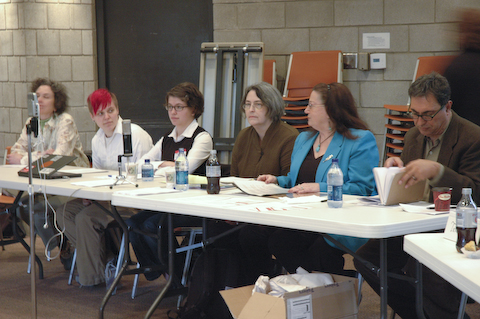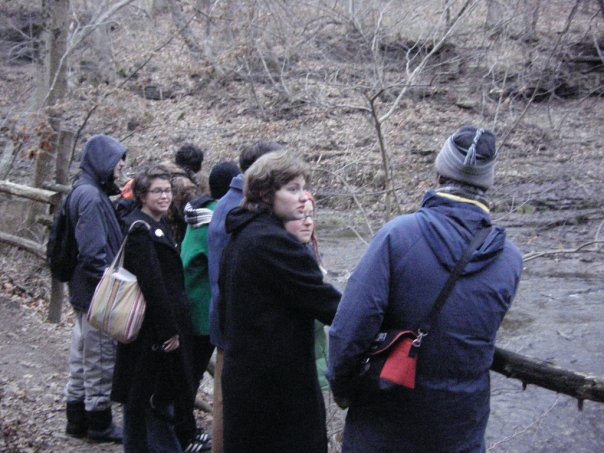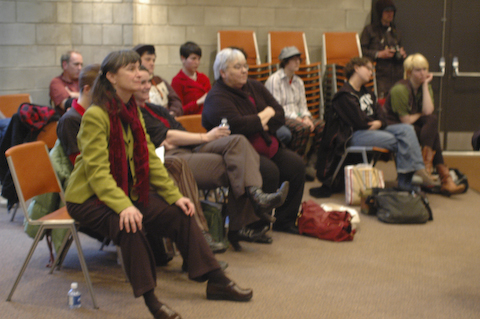The Record: My first question is for you to introduce yourself, in terms of your experience at Antioch: when did you graduate, what was your major, what was your Antiochian experience, what was your relationship to Antioch since you left?
Joe Foley: I’m Joe Foley and I graduated in ’64 with a B.S., I had a major in philosophy and a minor in math, and my primary interest at that time in my life was documentary film production which I did largely through co-op jobs because there weren’t any real courses on campus related to that. […] I worked a number of times with a documentary film company in DC and Antioch kept wanting me to take a wider variety of jobs and I kept saying but I’m doing a different things there every time so it came out my way as these things tend to at Antioch and it was very good. I also did a stand at a hospital as nurse’s aide and several odds and ends of things. After Antioch I did my graduate work at the University of Iowa, which turned out to be an excellent experience though Iowa city was a place I never thought I would go. And did my graduate work in communication, I was in speech and dramatic art and worked as a teaching assistant and ultimately as an instructor there largely teaching television production and running the instructional television studio that they had on the campus. After that I taught for a year at America University in DC and then went to what I thought was a temporary job at Ohio State University where I ended up staying 25 years. At Ohio State I was teaching some production classes, largely on the television side at that point, some social science research classes dealing with impact of media on audiences, and over the years my interest evolved and I became primarily focused on telecommunication policy things, first amendment issues, media and society issues, and issues that were developing in the 70s, 80s, 90s, as information was becoming a commodity rather than a kind of free good like it had been previously.
When did you become involved with the Alumni Board?
I joined the Alumni Board I think three of four years ago … and had been not particularly involved with the alumni association or with the alumni prior to that time. I certainly was not involved with the political aspects of campus life when I was on campus either.
Did you often come back to campus after you graduated?
Living in Colombus we came over to Yellow Springs a lot, particularly because our kids really liked coming to Yellow Springs, it was a town where they could go do things on their own…we would come to campus sometimes and sometimes come to a campus event but I didn’t have any particular ties with the campus.
You’re the new Vice President of the Alumni Board, how do you envision your role, how are Nancy Crow and you dividing tasks?
That’s very much evolving, and my view-in other organizations I’ve been board vice-president, I’ve been board president-my view is that the vice-president basically does the things that the president asks them to do. And one of the things that’s clearly gonna be part of my role is that I’m much closer to Yellow Springs than Nancy is so I’ll be more likely to be coming over here for meetings and so on.
So are you planning to interact with the Nonstop Community?
I’m certainly open to that; I don’t particularly feel like I need to impose myself on the Nonstop Community, which is clearly an exciting and dynamic and ongoing group. On the other hand if there’s ways I can be helpful, I’m glad to be and there may be some places where I feel I need to interfere and the Nonstop community will also see me in those roles.
And so you’re going to be more involved with the CRF office, is that what you meant by more involved in Yellow Springs?
Well, CRF, Nonstop, ExCil, all the other Cils… Don’t ask me to do a chart of how all the Cils relate to each other ‘cause I don’t know but… [I’ll be] involved in the whole movement for ongoing Antioch. But also that is very much a movement that is being done very well by a lot of very committed people in Yellow Springs who have invested large amounts of energy and creative kinds of problem-solving in making that happen.
What direction is the AB/CRF going to take in the next few months concerning the reintegration of Nonstop after the definitive agreement? What position do you see the AB/CRF taking?
Overall I don’t know that the Alumni Board has a position in the sense of “here is the particular scenario we wanna have played out,” I think that’s going to be an evolving piece of work over the next weeks, months, whatever the time frame turns out to be. The Alumni Board has a primary commitment to reopening an independent Antioch College in Yellow Springs with undergraduate instruction etc… the whole litany. And how we get from where we are now to that point clearly is something that’s going to continue to evolve based on the circumstances as they occur.
What are the next major decisions that the Alumni Board will be confronted with or issues that it will have to tackle?
The next major things I suppose are going to depend on what happens with the Board ProTem fundraising … If it comes out that yes there’s a definitive agreement, yes the Board Pro Tem Project is going forward then there is a whole series of things the Alumni Board has to do to handle the transition to that forward movement. If all of that turns out to be going nowhere then there’s clearly a whole series of other things the Alumni Board is going to be faced with and I don’t think anyone has any idea of how one would respond in that situation. The emphasis has been on what can we do to help increase the likelihood that the Board ProTem Proposal is going to be successful and that we can go forward in that direction.
Nonstop is a project of the CRF and Nonstop is coming to an end in terms of funding on June 30th. What is your position on what should happen after that, or how it should be reintegrated?
It’s not at all clear which of a number of directions that … will go. That’s gonna depend on external things, like what kind of funding if anything is available for various directions, and it’s going to depend on individual decisions from people who have been working with Nonstop. I think it’s certainly likely in a lot of those things that whatever is happening relating to Nonstop in the coming year will be substantially different from what happened this year. But what the parameters of that are, and which things will be different and which things will not be different, I don’t know. As far as I know there’s little likelihood that the funding sources that were available this year are gonna be available after the June 30th time period and that poses some pretty severe challenges to what could be designed going forward. One of the things the [AB] Task Force is looking in and a lot of people are looking in and talking about is what are some ways we can have a viable program going forward that captures the values and energies that Nonstop has had. If there were an easy answer to that everybody would be saying oh yeah there’s the answer, but apparently there’s not an easy answer to that.
At the last AB/CRF meeting we learned that there was a fundraising gap for Nonstop and we weren’t sure that the budget would be paid until June, do you have an update about that?
As of last night’s conference call with the executive committee, it looks like if the expenditures for Nonstop are within or below the budget figures, we’ll be able to reach the end of June in a position that’s ok. If the expenditures for Nonstop are above the budget figures, we have a real problem.
So we are going to be able to meet the budget target?
It looks as though the dollars available will be able to cover the dollars specified in the budget. The challenge is going to be will the expenses be within the dollars comprehended by the budget. It looks like we’re on target for that and but that is never an easy thing to do and the next few months are very critical in making sure that happens. And it’s important obviously ‘cause you can’t pay for things with money that doesn’t exist but it’s also important I think for the Nonstop story going forward; that story is told one way if the fiscal result of Nonstop is amazingly “this whole project was carried off with all these exciting things and was within budget” and that’s one kind of story and it’s a very exciting story, and another story that is not so exciting is “lots of interesting things happened at Nonstop but it really didn’t make any sense fiscally because it was over budget by x amount.” And even if x is a relatively small dollar figure, it really colors the way the story of Nonstop is told into the future. So I think it is very important that we be sure that it comes in with the expenses within the numbers comprehended within the budget.
My last question is how do you envision the upcoming few months?
I think the upcoming few months are going to be very very challenging for everyone. Saying we’re living with a lot of uncertainty certainly doesn’t make the news in Yellow Springs, you can’t imagine a headline saying the future of Antioch college is uncertain as being something anybody thought was a new breaking story, but in fact that is the case. And as the parameters become more apparent as to what that story is going to be, either going forward with the board ProTem or not going forward with the Board ProTem, or deferred judgment on the Board ProTem’s part or whatever the scenario happens to be and there are hundreds of them that could be out there that we all speculate on, then there’s going to be some real adjustments that are going to be made to that scenario.











